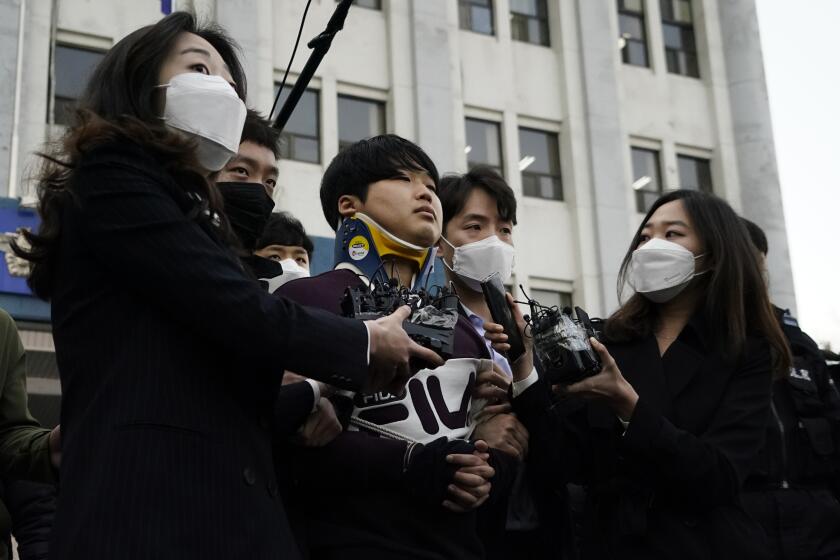
The target was a 29-year-old recluse who shared a two-bedroom apartment in Jerusalem with his mother.
FBI agent Tanaz Korami had been chasing him down for months. If all went as planned, he would soon be locked up in an Israeli jail.
When the wheels of her El Al flight hit the runway in Tel Aviv, the weight of the moment sunk in. The detective work had paid off. The FBI had unearthed more evidence than Israeli police would need to arrest the man, Elad Gaber.
In the U.S., where the FBI’s victim count was nearing 150 children, prosecution of Gaber remained a long way off, she knew. But this was a crucial step.
“This is it,” Korami told herself.
A few days later, Korami stepped into Gaber’s bedroom. It was just as she had imagined it from her desk at the FBI’s office in West Covina: a “dark dungeon” with the shutters closed on that sunny July day.
And there it was: A computer and piles of hard drives and disks.
“I remember seeing those and thinking, ‘Guys, make sure you bag and tag every piece of this,’” she said.

For more than a year, Gaber had been extorting webcam sex from girls as young as 12, nearly all of them American.
Widely known now as sextortion, this cybercrime — against both girls and boys — has become far more prevalent in the last few years. The investigation of Gaber would play a major role in shaping how the FBI responds to it.
By the time the FBI found out what he was doing in late 2010, Gaber’s methods were well set.
He would start by finding blackmail material: suggestive or nude images. He sometimes got them by secretly recording group video chats among teens on Stickam, a Los Angeles livestreaming site that is now defunct.
Gaber would then track the girl down on Facebook and impersonate a handsome blond boy to befriend her. His screen names included “Ethan Hunt,” “David Clint” and “Rach Hollis.”
He would tell the girl to join him in a live video chat, then play on her fear of humiliation: If she refused to “cam,” he would threaten to release the compromising images to friends and family members now visible to him on Facebook.
Subscribers get early access to this story
We’re offering L.A. Times subscribers first access to our best journalism. Thank you for your support.
The blackmail sometimes included screenshots to terrify the girl with a raw display of how mortifying the aftermath had been for another victim who refused to comply.
For Korami, one act of retaliation stood out from the others.
After a girl resisted his demands, Gaber sent sexually explicit images of her to her friends. The harassment at school got so bad that her family sold their house and moved to another town. “When she got to the new school,” Korami said, “those kids got hold of the material, and the bullying kept going on.”
When Gaber’s coercion succeeded, he would give the girl step-by-step instructions to produce live child pornography. If she burst into tears, he kept going. He sometimes used the new material to extort still more.
Some of the girls threatened to report Gaber to police. Go ahead, he would taunt them. He lived halfway around the world and could never be caught.
One of the first to defy him was a high school student in Lakewood, just outside Long Beach. Her case would spark the FBI investigation.
I remember seeing those and thinking, guys, make sure you bag and tag every piece of this
— Tanaz Korami
The girl’s parents reported the extortion attempt to the Los Angeles County Sheriff’s Department. Sheriff’s detectives sent Google a search warrant to get the suspect’s email. Once they read it and realized he was writing from Israel, they passed the evidence along to the FBI.
The case was assigned to Korami. Known to co-workers as Taz, she was then 27 years old.
She’d been recruited by the FBI a few years earlier in part because she speaks Farsi. Born in Iran, she grew up in San Diego, studied international affairs at UC Irvine and was about to start law school when she opted instead to accept the FBI’s offer — to the astonishment of her mother, an engineer, and father, an architect.
After an initial stint in counterterrorism, Korami asked to transfer to crimes against children. She was drawn by the clarity of the mission.
“It was just so black and white,” she said. “You do your work, and you make a difference in somebody’s life. I mean, you change the child’s life.”
Like a homicide detective who inspects grisly crime scenes, Korami would try to stay detached from the anguish of the online assaults.
“I have learned over the years how to kind of compartmentalize it and leave the horrific images kind of packed away in the back of the brain so that you can move forward and do the work to help the victims,” Korami said.
She started reading Gaber’s emails “to just kind of get an idea of who this person is, what they were doing, what’s the scope of the conduct.”
In minutes, she recognized the gravity of the case. Sextortion was becoming common, but the FBI had never seen a case with so many victims.
In a lucky break, Gaber had used his main Gmail account to contact the Lakewood girl, so his identity was known from the start.
The email also made clear that he had used Facebook to target nearly every victim, so Korami sent search warrants to the social media giant.
What Facebook provided in response laid bare the full sweep of Gaber’s extortions: He had used 92 aliases to target girls in the United States.
“That really is where this case just spilled wide open,” Korami said.
Korami set out to identify victims, figure out where they lived and pay them visits. The emotional jolt — for both the girls and their parents — was immense when an FBI team showed up on the doorstep.
“You always approach it with a delicate touch,” Korami said. Agents know that many parents “are not going to have the best reactions.”

It was a race against time. Week by week, the number of victims kept rising as Gaber found more girls to menace.
“We needed to stop this guy from having access to a computer, because every day that we waited, he was doing this to another girl,” Korami said.
Korami traveled with others on her team to Alabama, Arizona and Northern California. It quickly became clear they could never finish the interviews on their own.
Korami turned to a half dozen women on the FBI’s “CAFI” team — child and adolescent forensic interviewers. CAFIs, as they are known within the bureau, have master’s degrees in psychology or social work. They are stationed in FBI offices around the country.
Agents rely on their expertise in taking statements from children in a way that ensures prosecutors can use them in court. Kids are usually taken to a room where they can feel at ease outside the presence of their parents to minimize any fear they will get in trouble for what they reveal.
Some parents refused to allow their daughters to be interviewed. Others, overwhelmed with guilt, blamed themselves for not policing their kids’ web use more aggressively.
Still others failed to grasp that their children were not at fault.
In a recent interview with The Times, a woman who was 12 when Gaber forced her into sexual activity on camera in 2010 recalled her mother “crying profusely” and getting mad at her when Korami and her team showed up to ask questions.
Sextortion was not widely understood at the time. This woman’s mother, like many others, was unaware that its impact on a child’s mental health can resemble the aftermath of a physical rape.
“I wasn’t even a teenager yet, and it completely ruined me,” the woman said.
Cho Ju-bin masterminded one of South Korea’s most notorious sex crime schemes, blackmailing young women into providing sexually compromising images.
Some local police also were unprepared for sextortion complaints.
Katie Connell, one of the CAFIs who interviewed Gaber’s victims, was disturbed to hear from two girls that they gave in to Gaber’s demand for webcam sex only after police had rebuffed them and declined to investigate.
“That was heartbreaking,” said Connell, now chief of the FBI’s child victim services unit.
To catch Gaber, Korami would need to persuade Israeli police to arrest him. Through the FBI’s legal attache in Tel Aviv, she started supplying them with evidence. The Israelis opened their own investigation.
International cooperation in law enforcement can be painfully slow. But after nine months on Gaber’s trail, Korami was relieved to hear the Israelis were ready to raid his apartment in July 2011.
She flew to Tel Aviv with two others on the FBI’s team. Korami’s passport lists Iran — an enemy of Israel — as her birthplace, so a U.S. Embassy official met them at the airport to smooth her way through security, a precaution that turned out to be unneeded.
In Jerusalem a few days later, Korami waited in a car outside Gaber’s apartment building as Israeli police in bulletproof vests stormed in, arrested him and — with his stunned mother looking on — rummaged through his belongings.

Once the scene was secure, the police invited Korami in. Gaber was in handcuffs. He was calm, unsurprised. She was struck by how long his hair was.
“It looked like he hadn’t showered for days,” she said. “His nails were black. His eyes were all red, bloodshot almost like somebody who’s stayed up all night.”
Gaber’s routine was indeed to spend all night on his computer and sleep during the day, his mother, biologist Hava Glickstein, told police.
To Korami, that was a “fascinating piece of evidence,” because it corresponded to the time of day when he was blackmailing American kids.
Most important, though, was the data seized from Gaber’s bedroom — nearly five terabytes. It was enough to crash the computer system then used by the FBI for forensic analysis.
“I can confidently tell you that 98% of it qualified as child sexual exploitation material,” Korami said.
In all, she said, Gaber ensnared about 200 victims spread across nearly all 50 states.
For each one, Gaber had meticulously organized folders, subfolders and files, many of them labeled “BM” for blackmail. It was laid out as efficiently as a bookkeeper’s ledger. The girl’s name. The date he captured images to threaten her. Her Facebook friends list. The videos he extorted. The webcam chat transcripts.
Joey Blanch, the prosecutor who took the case to a federal grand jury in Los Angeles, spent hours matching videos of the girls to corresponding webcam chats that Gaber had saved.
“We had all of the chats, and all of the directions that he was giving these girls during the blackmail video sessions,” Blanch recalled.
The search of Gaber’s apartment also yielded video that he took of his neighbors having sex, enabling Israel to prosecute him on peeping-Tom charges while it deferred to the FBI on the larger sextortion case.
After serving 17 days in jail, according to his lawyers, Gaber did six months of community service, washing aquarium tank windows at a Jerusalem zoo.
I wasn’t even a teenager yet, and it completely ruined me
— Woman who was 12 years old when Elad Gaber blackmailed her into webcam sex
Another three years went by before U.S. prosecutors were ready to charge Gaber. CAFIs were still traveling around the U.S. gathering victim statements and reams of Israeli records needed to be translated from Hebrew.
“My office was full of boxes and boxes of documents we couldn’t read,” Blanch said.
In August 2014, the grand jury indicted Gaber on 68 counts of extortion, production of child pornography and related crimes against 19 victims. They ranged from 12 to 17 years old.
The indictment included a searing account of Gaber’s retaliation against one of the 17-year-old girls for refusing to do a live sex video.
In Facebook messages from his fake “Chance Lanbom” profile, he reminded her he already had a sexually explicit video of her. He threatened to post it on the web for “thousands of people” to see alongside her name and phone number. He referred to himself as “your blackmailer.”
“Can’t say I didn’t warn you and give you time,” he chided her in a message with “wake up” in the subject line.
Over the next 10 days, the indictment alleged, Gaber sent pictures of the girl masturbating to her mother, father, sister and some of her other Facebook friends, telling them she was “exposing her body to a random crowd.”
It took more than five years after Gaber was indicted to get him to the United States. He contested the extradition, but was finally flown to California in January 2020.
Six months later, he agreed to plead guilty to using the internet to induce the two 12-year-old girls and an unspecified number of other victims to produce child pornography.
He admitted disguising his identity behind at least 22 screen names to carry out his extortions, in some cases following through with threats to damage victims’ reputations by sending sexually explicit pictures of them to their friends and family.
Korami was watching from the prosecution’s table as Gaber shambled into a downtown Los Angeles courtroom for sentencing last October. A baggy beige jail uniform and shackles draped off his gaunt frame.
Exactly 11 years had passed since Korami opened the case.
“I just want to say I’m sorry,” Gaber, by then 39, told U.S. District Judge Philip S. Gutierrez. “But I don’t want to say — I can’t say anything more because I feel like it’s better if I don’t. But I want to say I’m sorry.”
Gaber’s attorney, Mark J. Werksman, tried for leniency.
“Your honor, Mr. Gaber suffers a severe mental handicap,” he told Gutierrez. Autism disorder “drove him out of society and turned him into basically a hermit.”
Gaber had been “drummed out” of the Israeli military after two weeks due to his poor mental health, he said, and his autism “deprived him of the ability to understand how much pain he inflicted on his victims.”
Werksman mentioned a letter from Gaber’s mother who described her son as friendless and disheveled for years. “It is hard to distinguish between right and wrong when you are so isolated,” she wrote.
A Hollywood woman is accused of hiring a TV actor to deliver the fentanyl-laced drugs that killed a Beverly Hills man.
Three of Gaber’s victims traveled to Los Angeles for the sentencing. All three urged Gutierrez to impose the maximum penalty.
“He blackmailed me into performing unspeakable sexual acts to myself while he recorded me,” one said. Gaber had made her feel worthless for years.
The woman who spoke with The Times told Gutierrez in graphic detail what Gaber made her do on camera when she was 12. She called it “torture.” It led to anxiety attacks, suicide attempts and a decade of therapy that failed to relieve her pain.
“That’s the sad thing about trauma,” she told Gutierrez. “It never simply goes away.”
He blackmailed me into performing unspeakable sexual acts to myself while he recorded me
— Woman who asked a judge to impose the maximum penalty on Elad Gaber
Assistant U.S. Atty. Catharine Richmond acknowledged Gaber’s autism, but said, “his own words tell you that he understood the impact this would have on the victims and chose to proceed forward anyways.”
On a courtroom monitor, the prosecutor displayed one of Gaber’s warnings to a girl during a chat: “Your life will be ruined.”
Gutierrez matter-of-factly sentenced Gaber to 30 years in prison, the maximum penalty.
Korami was elated.

“The damage he did to these women is incredible,” she said. “You think back, these girls were just at that formative age, where you’re just starting to become a woman and learn about your body and relationships and things like that, and he just stole that from them.”
By the time Gaber was imprisoned, Korami had been promoted to supervisory special agent. She worked in the FBI’s international violent crimes unit, then switched to international corruption.
She could have left the Gaber case behind and handed it off to another agent.
In nearly four hours of interviews, the only time Korami’s voice cracked was when she explained why she chose not to do that.
“I never passed it off to anybody else, because this was the case that I wanted to see through,” she said. “I promised the victims that I’d get them justice, and …” She stopped for a moment. “And I wanted to see it through.”
More to Read
Subscriber Exclusive Alert
If you're an L.A. Times subscriber, you can sign up to get alerts about early or entirely exclusive content.
You may occasionally receive promotional content from the Los Angeles Times.












